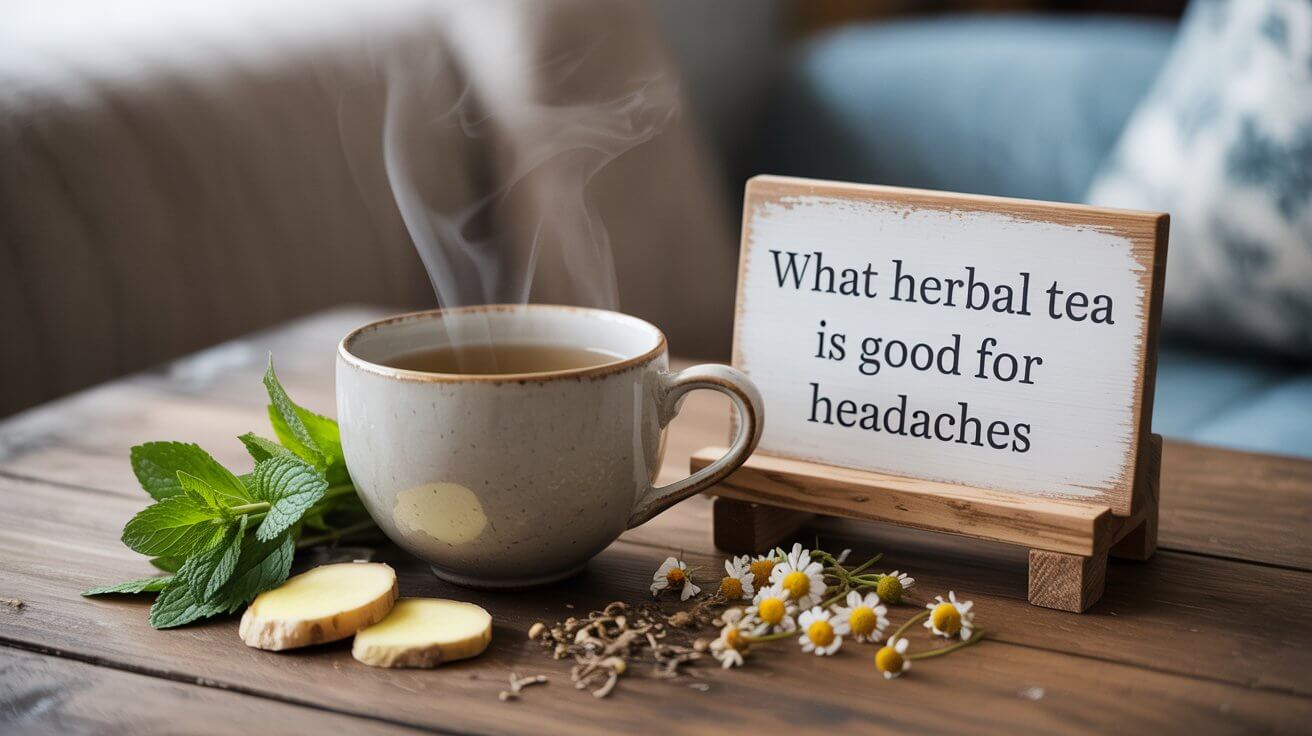Headaches are one of the most common health issues in modern life, often triggered by stress, screen time, dehydration, or poor posture. While painkillers offer quick relief, many people today prefer natural, holistic alternatives and one of the most soothing options is herbal tea.
Certain herbal teas contain natural anti-inflammatory, analgesic, and calming compounds that can help relieve headaches and migraines without side effects. In fact, recent studies (2024, Journal of Herbal Medicine) found that regularly drinking anti-inflammatory teas like peppermint or ginger can significantly reduce the intensity and frequency of tension headaches.
In this updated 2025 guide, we’ll explore the best herbal teas for headache relief, explain how they work, and share practical tips for using them safely plus a unique option that supports both headache relief and overall wellness.
Why Herbal Tea Helps with Headaches
Herbal teas work on multiple levels to ease discomfort and tension. Here’s how:
-
Hydration boost: Dehydration is one of the leading causes of headaches. Herbal teas, being mostly water, rehydrate your body and brain.
-
Anti-inflammatory effects: Herbs like ginger, chamomile, and willow bark naturally reduce inflammation that contributes to migraine pain.
-
Relaxation and muscle relief: Herbal infusions help your muscles relax and reduce stress, one of the top headache triggers.
Unlike synthetic medicines, herbal teas provide gentle, cumulative relief and can be safely enjoyed as part of a daily wellness routine.
Best Herbal Teas for Headache Relief (Backed by Science)
1. Peppermint Tea — The Cooling Comfort
Peppermint tea is among the most popular natural remedies for tension headaches.
The menthol in peppermint acts as a natural muscle relaxant and pain reliever, helping ease tightness in the head, neck, and shoulders.
A 2024 study in Phytotherapy Research showed that menthol aromatherapy and tea consumption both helped reduce headache duration in adults.
2. Ginger Tea — Anti-Inflammatory and Anti-Nausea
Ginger tea is ideal for migraines accompanied by nausea. Its main compound, gingerol, fights inflammation and helps regulate serotonin, which can calm migraine activity.
It also improves digestion and circulation two often-overlooked factors in headache prevention.
3. Chamomile Tea — The Stress-Soothing Classic
Chamomile tea is perfect for headaches triggered by stress, anxiety, or insomnia.
It contains apigenin, a natural compound that promotes relaxation and reduces muscle tension.
Drinking chamomile tea before bed can also prevent next-day tension headaches by improving sleep quality.
4. Feverfew Tea — The Traditional Migraine Fighter
Used in natural medicine for centuries, feverfew contains parthenolide, which helps prevent the dilation of blood vessels that often cause migraines.
Regular use may reduce migraine frequency, though it should be taken with medical advice, especially during pregnancy or if on medications.
5. Green Tea — Gentle Relief for Caffeine Withdrawal
If your headaches stem from skipping caffeine, green tea offers a gentle caffeine boost without the crash.
It also delivers antioxidants that reduce oxidative stress and inflammation.
Just one cup can ease withdrawal headaches while supporting focus and alertness.
6. Willow Bark Tea — Nature’s Aspirin
Willow bark contains salicin, the compound that inspired modern aspirin. It can ease pain and inflammation, but like aspirin, it should be used moderately and with caution for people sensitive to NSAIDs.
How to Drink Herbal Tea for Headache Relief
To make your tea more effective:
-
Drink it warm (not hot) to avoid irritation.
-
Hydrate with water alongside your tea.
-
Create a calming environment dim lights, use aromatherapy, and practice slow breathing.
-
Try blending teas for example, ginger + peppermint or chamomile + lavender for enhanced relaxation.
Precautions and When to See a Doctor
Herbal teas are complementary remedies, not replacements for medical treatment.
If you experience:
-
Severe or persistent headaches,
-
Vision disturbances, or
-
Headaches that disrupt daily life consult a healthcare professional.
Pregnant or breastfeeding individuals and those on medication should always seek medical advice before trying new herbal teas.
A Healthier Daily Option: All Day Slimming Tea
If you want a tea that supports overall wellness, digestion, and energy not just headache relief try All Day Slimming Tea.
This herbal blend combines green tea, oolong, dandelion, and ginger to:
-
Support metabolism and energy,
-
Reduce bloating and inflammation, and
-
Promote relaxation and detox naturally.
Many users in 2025 reviews report fewer headaches and improved focus after consistent use.
You can explore it directly at AllDaySlimmingTea and make it part of your holistic wellness routine.
Conclusion
So, what herbal tea is good for headaches?
Teas like peppermint, ginger, chamomile, feverfew, green tea, and willow bark all provide natural headache relief by reducing inflammation, easing stress, and improving circulation.
For a daily wellness boost, blends like All Day Slimming Tea combine these benefits into one refreshing formula helping your body feel lighter, calmer, and more energized.


Leave a Reply